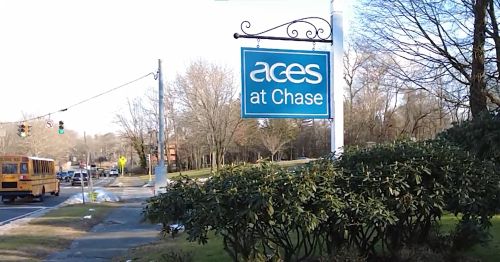-
Our Agency
- About Us
- Calendars
- Contact Us
-
Directions
- ACCESS
- ACES at Chase
- ACES International Preschool and Childcare Center
- ACES Transportation Services
- Center for Autism Spectrum and Developmental Disorders
- Central Office
- Educational Center for the Arts
- Educational Technology
- Little Theatre on Lincoln Street
- Mill Road School
- Network Services
- Staff Development / Administration
- Village School
- Whitney High School North
- Wintergreen Interdistrict Magnet School
- Human Capital Development
- Education Foundation
- News / Press
- Publications
- Request for Proposals
- Employment
- Events & Workshops
- Referrals
-
Schools & Programs
-
Special Education Schools
- Center for Autism Spectrum and Developmental Disorders
- Mead Elementary School
- Mill Road School
- Village School
- Whitney Academy EXPLORE & CREATE
- Whitney High School North
-
Magnet Schools
-
ACES Chase Academy
- About Us
- ACES Chase Academy: History & Origins
- Admissions
-
Student and Family Portal
- Breakfast and Lunch Menus
- Cancellations, Delays, and Early Dismissal
- Community Health Center
- Dress Guidelines
- Family Teacher Organization (FTO)
- Health Office
- Principal's Corner
- Monitoring Grades: PowerSchool Parent Portal
- Quick Links
- Student Handbook
- Athletics Handbook
- Summer Reading and Math
- Technology & Digital Citizenship
- Virtual Suggestion Box
- Document Library
- Contact Us
- Back to ACES
- Educational Center for the Arts
- Wintergreen Interdistrict Magnet School
-
ACES Chase Academy
- Alternative Education
- ACES Early Head Start
- ACES International
-
ACES International Preschool and Childcare Center
- About Us
- ACES International Preschool and Childcare Center Donations
- Admission Interest
- Meet the Staff - Newtown Center
- Meet the Staff - Woodbury Center
- Calendar
- Contact Us - Newtown Center
- Contact Us - Woodbury Center
- Family Portal
- Enroll Now: ACES International Preschool and Childcare Center Newtown Location
- Back to ACES
- ACES Open Choice
- Family and Community Engagement
- Magnet School Parent Choice
- School-Based Services
-
Special Education Schools
-
Services
- ACCESS Adult Vocational Services
- ACES Insurance Collaborative
- ACES UP Renewable Energy Solutions
- Alternate Routes to Certification
- Business Partnership Opportunities
- Center for Safe Schools
- Clinical Services
- Educational Technology
- Facility Rental
- Fingerprinting
- International Programming
- Marketing and Communications Services
- Network Services
- Professional Learning
- Regional Education Councils
- Regional Special Education Transportation
- Speech and Language Services
- Transportation
- World Language Translation Services
- Find
This series of FREE online modules is focused on enhancing academic outcomes for multilingual learners by increasing the capacity of school and district professionals to effectively meet the needs of their students through effective, research-based practices and strategies, and adherence to state/federal policies. These online modules were developed by the CT RESC Alliance in collaboration with the CT State Department of Education and consist of a video presentation and access to useful resources for teachers. Each module takes approximately two hours overall to complete, but all modules may be completed at your own pace. Educators are encouraged to participate in school/district teams.
View session descriptions below. Enrolling through Protraxx will give you access to the full series of modules. Additional modules are added as available.
RECENTLY ADDED MODULES
Reimagining Bilingual Programming
For TESOL/bilingual teachers, coordinators, coaches, and administrators.
Students in bilingual programming are entitled to access both native language support and English development. Navigating bilingual programming can prove particularly challenging for districts with relatively small bilingual student populations. In this module, participants will learn the laws and policies that govern bilingual education and ways in which we can honor native language and English development despite a variety of configurations of our school populations and programs.
Reimagining Dual Language Programming
For TESOL/bilingual teachers, coordinators, coaches, and administrators.
Dual language programming is the gold standard for multilingual learners, but many components go into creating a successful program. In this module, participants will explore resources about dual language education and consider their own school district’s model. Participants will also have the opportunity to reflect on how dual language practices might be integrated into other programming such as transitional bilingual or ESOL instruction.
Reimagining Pull-Out ESOL Services
For classroom teachers K-12, TESOL/bilingual teachers, coordinators, coaches, and administrators
Teaching English to Speakers of Other Languages (ESOL), also called ESL, is a tier I service provided to multilingual learners in different forms. Pulling a student out of class to develop English language proficiency comes with its own challenges in order to integrate the classroom learning goals and targets, work on discrete language skills to bolster classroom performance, & collaboration and communication between the ESOL teacher and classroom teachers. In this module, participants will learn about the pull-out approach, its goals, and strategies to improve student outcomes. Participants will understand why districts choose pull-out ESOL services and build strategies to make the program more effective and efficient.
Reimagining Push-In ESOL Services
For classroom teachers K-12, TESOL/bilingual teachers, coordinators, coaches, and administrators
The biggest challenge with supporting multilingual learners within the mainstream classroom revolves around the collaboration between the classroom teacher and the ESOL teacher. However, if done effectively, the push-in approach allows students to simultaneously access the curriculum and grow their English proficiency. By using intentional planning and clear protocols and structures for push-in, multilingual learners can access the learning more effectively with this approach. Participants in this module will understand the reasons why districts choose this approach and its impacts on student learning. In addition, they will gain some efficacy in making intentional decisions about how to effectively support students in the classroom.
Reimagining Sheltered Instruction
For classroom teachers 4-12, TESOL/bilingual teachers, coordinators, coaches, and administrators
Sheltered instruction (sometimes called SIOP, GLAD, CALLA, or SDAIE) is a term used to describe a designated course of study for multilingual learners in grades 6-12, although sheltered instruction can be used in any grade level. This module will discuss the programmatic components of sheltered instruction and effective instructional components of sheltered instruction. Participants will develop a clear understanding of sheltered instruction and ways to create or improve their programming for students.
CELP Standards Remix
For classroom teachers K-12, TESOL/bilingual teachers, coordinators, coaches, and administrators new to CELP or who need a refresher
In this module, learn about the CELP Standards and approaches in planning, collaboration, instruction, and assessment employing the resources found in the CELP document. The CELP Standards highlight and amplify the critical language, knowledge about language, and skills for using language that are necessary for ELs to be successful in school. Since that time, educators have been using the standards to plan, adapt lessons, tasks, and instructional approaches, and assess students’ language proficiency.
MORE MODULES!
13 Access Points for English Learners (PreK-12)
For classroom teachers PreK-12, TESOL/bilingual teachers, coordinators, coaches, and administrators
In this module, participants will enhance their knowledge and skills in implementing specific instructional strategies that make content and instruction accessible to English learners (ELs) whether delivered in person or online. Remote learning and reduced instructional time have further exacerbated issues of access for ELs. The first half of this module presents strategies to make content and language (input) accessible to ELs. The second half of the module presents strategies for scaffolding student responses (output). Online tools for implementing strategies are also shared in each section.
Cultural Competence and English Learners (PreK-12)
For classroom teachers PreK-12, TESOL/bilingual teachers, coordinators, coaches, and administrators
In this module, participants will explore some of the deeper factors of our systems, institutions, and selves that impact the experiences of English learners. Participants will learn about the most essential components of culturally relevant pedagogy, what it looks like, and why it is important for all students and essential for English learners. In addition, participants will become more aware of and knowledgeable about the many factors that comprise identity, and understand that culturally competent teachers are aware of their own beliefs, attitudes, and biases.
Designing Accessible Learning Experiences for English Learners in Secondary Classrooms (6-12)
For 6-12 secondary classroom teachers, instructional coaches, coordinators, TESOL/bilingual teachers, administrators
In this module, participants will learn about the impacts of second language acquisition on student performance and instructional strategies aligned to the principles of effective pedagogy to better meet the needs of all learners in secondary classrooms. By examining research-based practices for English learners and the principles of Universal Design for Learning (UDL), participants will understand how effective instruction for English learners is shaped by the students' strengths and abilities, not deficits; engage learners; and provide pathways for accessing course content.
Digging to the Core: Respectful Tasks and Texts for English Learners in Secondary Classrooms (6-12)
For 6-12 secondary classroom teachers, instructional coaches, coordinators, TESOL/bilingual teachers, administrators
In this module, participants will learn how to engage English learners (ELs) at all proficiency levels in learning experiences in secondary classrooms. Participants will learn about the impacts of second language acquisition on student performance and what approaches teachers can use to meet the diverse needs of ELs and course goals, including using the CT English Language Proficiency (CELP) Standards and approaches from Universal Design for Learning (UDL). Participants will learn how to analyze tasks and texts for complexity and depth of knowledge with a focus on access points for ELs at all ability and proficiency levels.
Effective Pedagogy for English Learners: Theory vs. Practice (K-12)
For ESL/bilingual teachers, instructional coaches, K-12 teachers of ELs, coordinators, administrators
In this module, participants will explore theoretical frameworks for effective instruction for English learners (ELs) to increase the capacity of teachers to meet the diverse needs of ELs in K-12 classrooms. By examining research-based practices and principles of best practice for ELs, the CELP Standards, and second language acquisition theories, participants will understand how intentional decision-making about ELs can positively impact student performance. This workshop will support teachers of ELs in making instructional decisions about access for English learners, such as goal setting and language objectives, accessing texts and course content using technology tools, and constructing oral and written explanations or arguments, while focusing on meeting the course expectations.
English Learners in CT Schools: Guidelines for Administrators (K-12)
For TESOL/bilingual teachers, coordinators, coaches, and administrators
In order to create equitable and inclusive learning environments for English learners, it is crucial that leaders in education first build awareness of laws, mandates, and policies that guide the best-practice programming decisions for English learners. As such, the CT State Department of Education has developed the English Learners in Connecticut’s Public Schools: Guidelines for Administrators, which outlines the responsibilities districts have to appropriately service the English learner population. In this module, participants will engage in interactive protocols and activities focusing on the critical elements of the guide.
English Learners in the Inquiry Process (3-12)
For science and social studies teachers 3-12, TESOL/bilingual teachers, coordinators, coaches, and administrators
In this module, participants will engage in a structured inquiry to answer their own compelling and/or driving questions about English learners (ELs) in the inquiry-based learning environments. Participants will use the CT English Language Proficiency (CELP) Standards to help interpret the performance of ELs in their classrooms and determine what supports are best suited for ELs at different levels of English language proficiency. Additionally, participants will gather specific information and methods in order to answer their questions.
Oral Language Development & Foundational Reading Skills for English Learners (PreK-3)
For preK-3 elementary classroom teachers, instructional coaches, coordinators, TESOL/bilingual teachers, administrators.
In this module, participants will learn about the stages of second language acquisition and language proficiency levels in order to build capacity to make better instructional decisions about English learners (ELs) in their classrooms in oral language development and reading. Through interactive experiences, participants will see the importance of oral language development to build comprehension as reading proficiency and overall English proficiency develops in ELs.
Processes and Procedures for Identifying English Learners (K-12)
For TESOL/bilingual teachers, coordinators, guidance counselors, and administrators
In this module, participants will learn about and review programming needs in their district by understanding identification, assessment, and placement regulations for the enrollment of English learners (ELs). The group will discuss and apply state updates to their district and school policies and/or practices. Additionally, participants will gather specific information and methods regarding advocating for and assisting ELs and their families as they adjust to new routines and norms.
Scaffolding to Support English Language Development (K-5)
For K-5 elementary classroom teachers, instructional coaches, coordinators, TESOL/bilingual teachers, administrators.
In this module, participants will learn about the benefits of thoughtful, effective scaffolding strategies for English Learners (ELs), as well as discover high-yield scaffolding practices to support their students in processing new learning and achieving learning goals in elementary classrooms. By examining research-based scaffolding techniques for ELs, participants will understand how scaffolds enable all students to experience, rather than avoid, the complexity of texts required by the Common Core State Standards.









